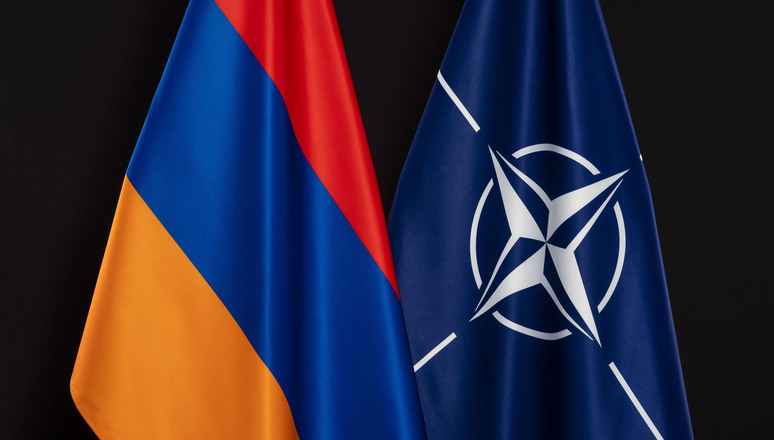Relations with Armenia
Armenia contributes to the NATO-led operation in Kosovo and cooperates with Allies and other partner countries in many other areas. A key priority for NATO is to strengthen political dialogue and to provide focused advice and assistance in support of democratic, institutional and defence reform efforts in Armenia.

- Relations with NATO started in 1992, when Armenia joined the North Atlantic Cooperation Council. This forum for dialogue was succeeded in 1997 by the Euro-Atlantic Partnership Council, which brings together all Allies and partner countries in the Euro-Atlantic area.
- Bilateral cooperation began when Armenia joined the Partnership for Peace (PfP) programme in 1994.
- Armenia is an active contributor to the NATO-led operation in Kosovo.
- Armenia’s programme of cooperation with NATO is set out in an Individual Partnership Action Plan (IPAP), which is jointly agreed. The wide range of the IPAP means that Armenia cooperates with NATO not only in the defence sphere, but also on political and security issues, democratic standards, rule of law, and the fight against corruption.
- NATO supports all constructive efforts by Armenia and Azerbaijan to normalise their relations and reach a lasting peace settlement.
Key areas of cooperation
Armenia’s cooperation with NATO is mutually beneficial and includes:
Building capabilities and interoperability
- Since 2002, Armenia has participated in the PfP Planning and Review Process (PARP), which helps develop the ability of Armenia’s forces to work with NATO forces on operations.
- A key priority for Armenia is to ensure democratic control of the armed forces. NATO has also supported the introduction of civilian personnel to the Armenian Ministry of Defence.
- In 2008, Armenia joined NATO’s Defence Education Enhancement Programme (DEEP) to help reform its professional military education institutions. DEEP contributed to the drafting of the Armenian Military Education Concept, the development of several specialised training courses, and the creation of the National Defence Research University in Yerevan.
- In 2013, the Armenian Ministry of Defence joined NATO’s Building Integrity (BI) programme. Once Armenia completes the NATO Self-Assessment and Peer Review Process (which started in 2014), the country will benefit from NATO BI tailored support to enhance good governance practices and to reduce corruption risks in the defence sector.
- NATO and individual Allies have supported Armenia’s efforts to develop interoperability with NATO forces of the Armenian Peacekeeping Battalion and enable it to become a brigade with associated combat support and combat service support units.
Support for NATO-led operations and missions
- Armenia has contributed troops to NATO’s Kosovo Force (KFOR) since 2004.
- From 2009, the country also supported the NATO-led International Security Assistance Force (ISAF) in Afghanistan and, following the completion of ISAF’s mission, supported the NATO-led efforts to train, advise and assist Afghan security forces, known as the Resolute Support Mission (RSM).
Wider cooperation
- NATO supports Armenia through a Trust Fund which has the twin objective to support the demilitarization, dismantling and disposal of decommissioned military vehicles as well as to provide mine risk education on explosive remnants of war (ERW).
- Armenia works with NATO’s Euro-Atlantic Disaster Response Coordination Centre (EADRCC) to improve its emergency preparedness and response capabilities, to deal with disasters and asymmetric threats, to improve contingency planning, and to contribute to international disaster relief operations. NATO and Armenia have also cooperated on the establishment of the Crisis Management National Centre in Yerevan.
- Since 1993, Armenia has engaged with the NATO Science for Peace and Security (SPS) Programme. Key areas for cooperation have included defence against chemical, biological, radiological and nuclear (CBRN) agents, counter-terrorism and advanced technology.
- Armenia organises an annual NATO Week to raise public awareness of NATO and Armenia’s cooperation with the Alliance.
